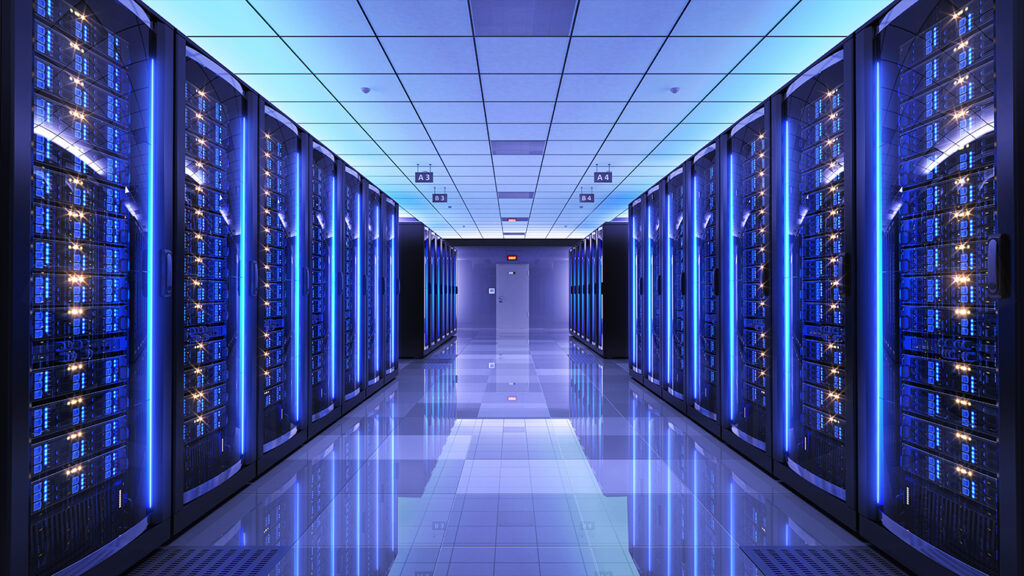Data centers, the immense warehouses that hold, process and distribute seemingly endless amounts of data, are also an unassuming commercial real estate powerhouse. Hyperscale data centers built by tech giants such as Apple or Google are projected to grow 53% by the year 2021, in comparison to the number of existing data centers in Q4 2016.
A solid history of economic performance—even during severe downturns—combined with a continued growth of global digitalization trends makes this property type particularly attractive to real estate investors. The utility of the future, you could say.
Think about it. If you could invest in a power company when the industry was first starting out, wouldn’t you want to do that? Hundreds of billions of dollars are being spent here, and the yields are higher than most other investments in real estate. Typically, investors are building to a 12% cap rate or higher and then levering up to a 5-6% cap upon stabilized occupancy. These figures far exceed those of traditional real estate, and data centers are also a hedge against recessions, since most are considered ’mission critical‘ to the operations of the tenant.
Here is a review of some of the ways that data centers have proved to be strong investments.
Recession-Proof?
Any industry that utilizes an internet network can’t do so without a data center, which stores, processes and distributes all that data in the background of any given company’s operations. This said, data centers don’t necessarily fluctuate with normal market supply and demand factors, since what they supply is unquestionably integral to the operations of so many other industries.
Aside from being crucial on an industry level, data centers are also imperative to the daily lives of average Americans. If you pay your bills online, stream music through Spotify or Pandora and connect with friends and family on various social media networks, all of these activities couldn’t operate without the existence of data centers, a sector which remains strong regardless of the ebbs and flows of the economy.
Global Digitalization Trends
Companies are increasingly integrating the internet into how they conduct all aspects of business. This isn’t surprising, but it’s important to note that this trend continues to grow as digitalization becomes more commonly understood and developed. As businesses large and small continue to shift toward more tech-centric, internet-driven models, their IT infrastructures will also need to keep pace with this change, making data centers a hidden, but inevitable, part of this growth. According to Cisco, overall data center workloads will more than double from 2016 to 2021, and will triple in regard to cloud computing over the same time period.
Internet access was relatively expensive in the early years of internet adoption. But as widespread corporate and personal usage increased, that cost dropped precipitously, enabling entirely new business models. With Netflix, for example, network costs dropped to the point where in 2007, the company started streaming high definition content online, essentially replacing their mail delivery service.
Now, 11 years later, online streaming has exploded, with internet entertainment threatening established media. “What we’re witnessing now is a transformation that is every bit as game-changing as the industrial revolution,” says Thompson. “Up until recently, the internet was quite limited because the cost was so high. The costs are coming down—and what we’ll see going forward will be a boom of even more content moving online. That’s what data centers really do, they’re essentially big content-generating plants, similar to the original power plants of the first industrial revolution.”
Autonomous Vehicles Could Change the Future of Data Centers
What role will data centers play as autonomous vehicles make an entrance into the market in the not-so-distant future? In order for a car to drive itself, it will need advanced technology, along with some sort of a network connection. “At some point, that vehicle has to connect to the internet,” notes Thompson. Although it’s not entirely clear as to how many of those connections will reside in a self-driving car itself vs. remotely, it’s certain that the emergence of self-driving cars will change aspects of how data centers operate and communicate, further strengthening its permanence in terms of connectivity to other industries.
A Strong Investment Choice
As technology further develops, the importance of the internet is clear in terms of how individuals and industries operate. Although not obvious at first glance, data centers are the foundation for the sustainability of all company’s data and are imperative for the vitality of a variety of industries. Their ability to withstand dips in the economy and the necessary role they play in the growth of the internet have well-positioned data centers as a strong investment option now and for years to come. “There are billions of dollars coming into the industry, which has created a wonderful environment for investors and end users alike,” concludes Thompson.

 Colliers Insights Team
Colliers Insights Team

 Anjee Solanki
Anjee Solanki Raul Saavedra
Raul Saavedra
 Shawn Janus
Shawn Janus
 Baily Datres
Baily Datres Mike Otillio
Mike Otillio